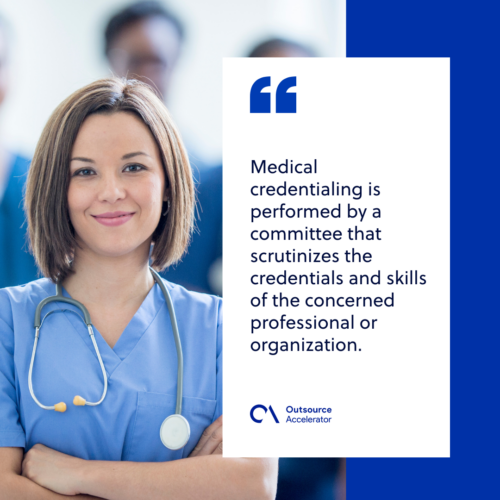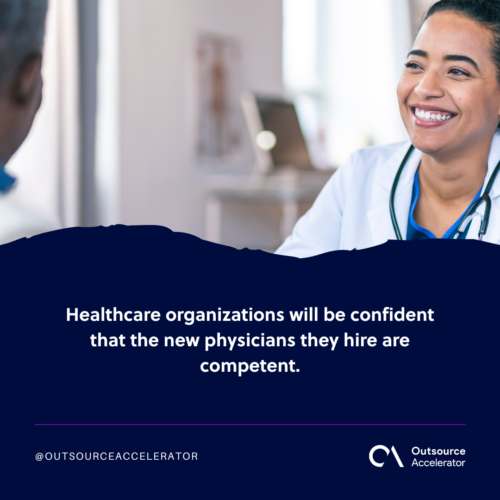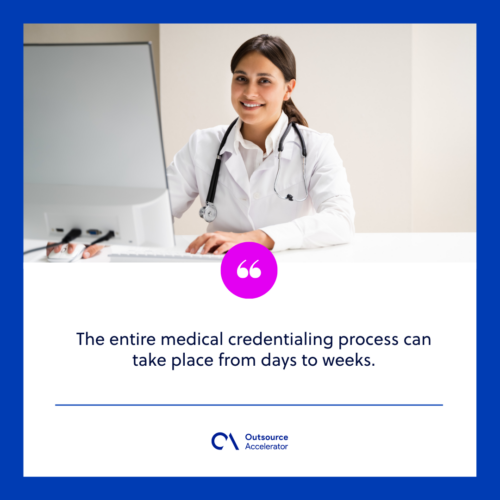Medical credentialing 101: Understanding how it works and how much it costs

In any industry, credentialing is integral to solidifying a reputation and name to make them a staple and trusted brand in the sector.
Medical credentialing is important as the credibility and integrity of a healthcare establishment and its operations are at stake.
Medical credentialing vs. Medical privileging
Medical credentialing consists of two parts: credentialing and privileging. Essentially, medical credentialing is the review and verification of the competency and skills of a professional.
This is performed by thoroughly reviewing the professional’s education, work experience, training, and acquired licenses.
Normally, medical credentialing is performed by a committee that scrutinizes the credentials and skills of the concerned professional or organization.
On the other hand, privileging is the granting of approval to healthcare providers. This means they can conduct medical procedures as demonstrated by their competency and skills based on the medical credentialing process.

How does medical credentialing work?
Essentially, medical credentialing is a market-oriented review process that aims to ensure that quality standards of practices are met and maintained within the healthcare industry.
The overall goal is to ensure that patients receive the quality care they deserve. To this end, the review process involves an in-depth verification with primary sources to attest to the competency of healthcare providers.
The Credentials Verification Organization (CVO) will validate through the medical schools and universities to ascertain the degree, training, and fulfillment of residency by the physicians.
The CVO will also communicate with various licensing agencies and certification boards to check the validity of the presented certificates and licenses.
Normally, medical credentialing is conducted for all new hires. Still, from time to time, there are periodic reviews conducted to check whether providers conform to the medical standards set by accrediting organizations.
Advantages of medical credentialing
There are various benefits in the medical credentialing process, including the following:
Quality assured
The entire medical credentialing process ensures that the industry, especially the healthcare provider, is consistent with the quality standards set by the industry.
Healthcare organizations will be confident that the new physicians they hire are competent. They are assured that there will be fewer risks of fraud and malpractice, which can jeopardize the integrity and reputation of the organization.
Privileges are received
Physicians who are accredited by the CVO will be entitled to all the privileges given by insurance companies. This will allow them to get more patients for them.
Also, it is important to process their professional fees and the accounts receivable in healthcare.
Reduces medical errors
By ensuring that healthcare providers have met strict credentials, hospitals and other organizations can significantly reduce the risk of medical errors.
Proper credentialing ensures that healthcare professionals are competent, reliable, and trustworthy. This can ultimately improve patient safety and reduce the likelihood of medical malpractice claims.
Provider credentialing also ensures that healthcare providers adhere to a high standard of care. And that they remain up-to-date with the latest medical practices and technologies. These factors ultimately help better patient care.
Provide patient confidence
Medical credentialing plays a crucial role in instilling confidence in patients.
Healthcare providers that have undergone a thorough screening process build trust and reassurance.
Medical credentials assure patients that their medical providers have met rigorous standards. And they have the necessary expertise to deliver high-quality care.
This confidence allows a more comfortable and secure patient treatment. Knowing that they are in the hands of qualified professionals who are dedicated to their well-being.
Maintains adequate staff levels
Medical credentialing is vital in ensuring that a healthcare company maintains appropriate staff levels.
Healthcare credentialing ensures that only qualified and competent medical professionals join the team by carefully verifying their qualifications, licenses, and experience.
This process helps prevent understaffing issues and ensures that the healthcare facility has the right personnel to provide quality patient care.
Prevents revenue loss for healthcare facilities
The significance of medical credentialing goes beyond ensuring a qualified workforce. It also serves as a safeguard against revenue loss.
Credentialing processes help healthcare providers have verified credentials and backgrounds. These procedures prevent potential billing errors, claim denials, and compliance issues.
It also ensures that the medical facility can bill accurately for services rendered, reducing the risk of revenue leakage due to incorrect billing practices or inadequate documentation.
With properly credentialed staff, healthcare organizations can maintain a smooth revenue cycle. It ultimately optimizes financial outcomes and bolsters the success of the practice.

What facilities require medical credentialing?
The medical credentialing process is thorough and in-depth. It is extensive enough to cover all the aspects of the healthcare industry to ascertain the level of competency and credibility of providers.
There are various healthcare providers, but the majority of those that undergo strict credentialing are:
- Surgeons
- Physicians
- Ophthalmologists
- Neurologists
- Podiatrists
However, it is not only healthcare practitioners that undergo stringent medical credentialing processes.
Major facilities and healthcare organizations are also obliged to keep their certifications and licenses credible and updated. Some of these facilities are:
- Diagnostic centers
- In-home care services
- Laboratories
- Radiology and diagnostic imaging
- Ambulances
This thorough healthcare credentialing is necessary to ensure the safety and security of patients across all the medical procedures they undergo.
This will also ascertain that the complications they are experiencing will not be aggravated due to the improper administration of care.
How long does the process of medical credentialing normally take?
The entire medical credentialing process can take place from days to weeks. The end result varies in factors such as:
- Field of expertise
- Completeness of information and documents
- The type and competency of CVO tapped for the credentialing process
With these in mind, it is ideal to begin the medical credentialing process three months prior to the start date with a healthcare organization.
This is enough time to counter-check and verify with the different institutions and offices. It will also address any discrepancies that the CVO can clarify.
It is important to note that CVOs have no control over the response and speed of reaction of the organizations and offices they are dealing with.
The medical credentialing process includes verification, evaluation, and approval. It will take time to elicit the right information to make requests, set up meetings, and address delays.
One of the best ways to speed things up is for the requester to contact the relevant schools, offices, and institutions with which it has acquired its degree, licenses, and certifications.
This will prompt them to expect a message or request from the chosen CVO, which they can process immediately and with fewer delays.
It will also increase the chances of the entire medical credentialing process to only just take a few weeks, which will greatly benefit new hires as they can start soon.

How much does medical credentialing cost?
There are no fixed costs to medical credentialing services. The cost of it depends hugely on the specialization of the provider and the interactions between facilities and CVOs.
Normally, requesters will need to shell out a hundred dollars to process their application. This fee is reimbursable upon successful completion of the medical credentialing.
Periodic credentialing will happen with CVOs after the initial phase in a provider’s early years. This is to ensure that the quality of care is maintained.







 Independent
Independent




